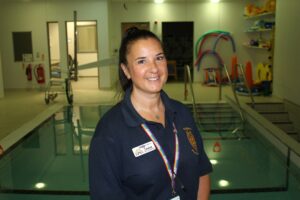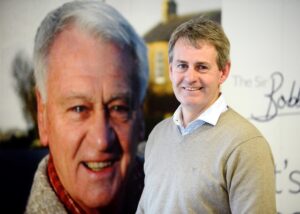NEW ROLE AT TO SUPPORT CHILDREN AND YOUNG PEOPLE WITH CANCER
A pilot role to help children and young people with cancer stay more active and help improve their physical and mental well-being, has been funded by our Foundation.
Based at the Great North Children’s Hospital in Newcastle, Louise Graham is clinical lead paediatric physiotherapist for the iCanMove project and her aim is to support younger cancer patients from across the North East and Cumbria during and after treatment.
Louise, from South Shields, has worked in oncology for 10 years and is passionate about the positive effects of activity, which can help reduce and manage the effects of cancer treatment. Staying active can also enable earlier discharge from hospital, reducing the need for follow up rehabilitation appointments and meaning younger patients will spend less time in a clinical setting.
In her new role, Louise will not only be directly working with young patients, she will also be helping parents and schools, community groups and sports organisations to provide information on how best they can give support.
Louise says: “It’s tough facing cancer at any age and, when you’re young, you can find your world shrinks very suddenly if you’re not able to take part in the things you enjoy.
“And we know that activity, not necessarily exercise but anything that keeps you active and engaged, can really help young patients during cancer treatment. There are obviously challenges to overcome to make this possible and that’s where I’m hoping to make a difference.
“It’s about giving reassurance to parents that it’s ok to keep taking their child to Tumble Tots or to Scouts, netball, football, whatever it is, and to provide the information they need, and often the community group or sports club also needs, to ensure their child can safely take part in some capacity.”
Children and young people with a cancer diagnosis can suffer significant long-term effects from
both their diagnosis and the toxicity of their treatment. They often have physical issues after treatment that requires physiotherapy and this can lead to delayed discharges or even readmission to hospital
for a period of intense rehabilitation.
Louise adds: “After a diagnosis, many young patients and their families report feeling a lack of control in their life ahead. With this new approach, we hope to motivate and encourage them by providing a proactive physiotherapy service that will be empowering for patients and their families and give them the tools to take back some control over their long-term well-being.
“Our ultimate aim is to make activity a mainstream of cancer treatment and for physiotherapy to be a proactive and positive service during treatment, rather than something needed after a child or young person has been inactive for a long time. It’s an approach I’ve wanted to try for a long time and I’m very hopeful it’s going to be beneficial for young cancer patients.”
A pilot role, Louise will initially be focussing her efforts on supporting children and young people with leukaemia, a type of cancer that can require lengthy treatment.
Her work will include creating personal pathways of activity for children, as well as resources and information to help schools, community organisations and sports clubs, and being available to provide specialist guidance and advice.
Mark Robson, chair of The Sir Bobby Robson Foundation board of trustees, says: “This is a new role we can see making an enormous difference for children and young people facing cancer.
“Louise is extremely passionate about this innovative way of helping younger patients and we hope it will make a huge difference in terms of their physical and emotional well-being during and after treatment.
“I know my dad would be all for anything that helps cancer patients stay as active as possible and would be very proud to know his Foundation is helping facilitate that.”





